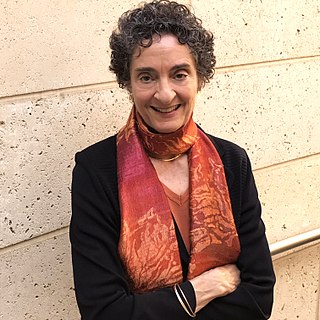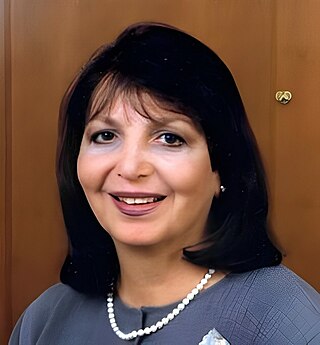Related Research Articles
Terrence Joseph Sejnowski is the Francis Crick Professor at the Salk Institute for Biological Studies where he directs the Computational Neurobiology Laboratory and is the director of the Crick-Jacobs center for theoretical and computational biology. He has performed pioneering research in neural networks and computational neuroscience.

Carla J. Shatz is an American neurobiologist and an elected member of the American Academy of Arts and Sciences, the American Philosophical Society, the National Academy of Sciences, and the National Academy of Medicine.
The Gruber Prize in Genetics, established in 2001, is one of three international awards worth US$500,000 made by the Gruber Foundation, a non-profit organization based at Yale University in New Haven, Connecticut.

Huda Yahya Zoghbi, born Huda El-Hibri, is a Lebanese-born American geneticist, and a professor at the Departments of Molecular and Human Genetics, Neuroscience and Neurology at the Baylor College of Medicine. She is the director of the Jan and Dan Duncan Neurological Research Institute. She became the editor of the Annual Review of Neuroscience as of 2018.
Masakazu "Mark" Konishi was a Japanese neurobiologist, known for his research on the neuroscience underlying the behavior of owls and songbirds.
Christine Elizabeth Holt FRS, FMedSci is a British developmental neuroscientist.

Huda Akil is a Syrian-American neuroscientist whose research has contributed to the understanding of the neurobiology of emotions, including pain, anxiety, depression, and substance abuse. Akil and her colleagues are best known for providing the first physiological evidence for a role of endorphins in the brain and demonstrating that endorphins are activated by stress and can cause pain inhibition.
The W. Alden Spencer Award is awarded to an investigator in recognition of outstanding research contributions by the College of Physicians and Surgeons, the Department of Neuroscience, and The Kavli Institute for Brain Science at Columbia University. It is named after W. Alden Spencer, a Professor of Physiology and Neurology at Columbia University. The award winner also gives a lecture. In 2018, it took place at on October 9, 2018. Since 2018, the award transitioned to a biennial schedule, alternating with the Eric R. Kandel Lecture, providing a platform for honoring developing talent in the field.
Robert H. Wurtz is an American neuroscientist working as a NIH Distinguished Scientist and Chief of the Section on Visuomotor Integration at the National Eye Institute. He is a member of the US National Academy of Sciences and the American Academy of Arts and Sciences. He is recognised for developing methods for studying the visual system in 'awake-behaving' primates, a technique now widely used for the study of higher brain functions. He pioneered the study of the neuronal basis of vision and its relation with cognitive functions.
Rao Yi is a Chinese neurobiologist. A Ph.D. graduate from the University of California, San Francisco, Rao held a Helen Hay Whitney fellowship at Harvard University and was on the faculty of Washington University in St. Louis and Northwestern University before moving back to China to take up the deanship of Peking University's School of Life Sciences in 2007. He is currently Director and Principal Investigator of IDG/McGovern Institute for Brain Research at Peking University.
The Brain Prize, formerly known as The Grete Lundbeck European Brain Research Prize, is an international scientific award honouring "one or more scientists who have distinguished themselves by an outstanding contribution to neuroscience and who are still active in research". Founded in 2011 by the Lundbeck Foundation, the prize is associated with a DKK 10 million award to the nominees, the world’s largest brain research prize.
Rosalind Anne Segal is an American neurobiologist. She is a Professor of Neurobiology at Harvard Medical School and the Dana Farber Cancer Institute., and the Dean for Graduate Education at Harvard Medical School Segal's work employs modern methods of cell and molecular biology to study the development of the mammalian brain with the goal of understanding how disruption of this normal process leads to the formation of brain malignancies.
Yuh Nung Jan is a Taiwanese-American neuroscientist. He is the Jack and DeLoris Lange Professor of Molecular Physiology at the University of California, San Francisco, where he works together with his wife Lily Jan as co-PIs of the Jan Lab.

Rafael Yuste is a Spanish–American neurobiologist and one of the initiators of the BRAIN Initiative announced in 2013. He is currently a professor at Columbia University.

Mu-ming Poo is a Chinese-American neuroscientist. He is the Paul Licht Distinguished Professor Emeritus at the University of California, Berkeley and the Founding Director of the Shanghai-based Institute of Neuroscience (ION) of the Chinese Academy of Sciences. He was awarded the 2016 Gruber Prize in Neuroscience for his pioneering work on synaptic plasticity. At ION, Poo led a team of scientists that produced the world's first truly cloned primates, a pair of crab-eating macaques called Zhongzhong and Huahua in 2017, using somatic cell nuclear transfer (SCNT).
Yang Dan is a Chinese-American neuroscientist. She is the Paul Licht Distinguished Professor of Neurobiology at the University of California, Berkeley and a Howard Hughes Medical Institute (HHMI) Investigator. She is a past recipient of the Alfred P. Sloan Research Fellowship, Beckman Young Investigator Award, and Society for Neuroscience Research Awards for Innovation in Neuroscience. Recognized for her research on the neural circuits that control behavior, she was elected to the US National Academy of Sciences in 2018.
The Ralph W. Gerard Award of the Society for Neuroscience (SfN) is an award in neuroscience awarded annually since 1978 for Lifetime Achievement. It is the highest recognition conferred by the SfN. As of 2018, the prize winner receives US$25,000.
HollisT. Cline is an American neuroscientist and the Director of the Dorris Neuroscience Center at the Scripps Research Institute in California. Her research focuses on the impact of sensory experience on brain development and plasticity.
Joshua R Sanes is an American neurobiologist who is known for his contributions to the understanding of synapse development. Throughout his career, Sanes has been the recipient of various awards and honors, including membership to the U.S. National Academy of Sciences. His research involves an interdisciplinary approach which focuses mainly on the formation of synapses at the neuromuscular junction by combining the sciences of psychology, chemistry, biology, and engineering to study these circuits and employ molecular and genetic imaging to understand their function. Sanes currently lives in Boston, Massachusetts with his wife, Susan, and their two children.
Wolfram Schultz, is a German professor of Neuroscience at the University of Cambridge known for his research that dopamine neurons signal errors in reward prediction.
References
- ↑ Sanders, Robert (7 June 2016). "Mu-ming Poo awarded $500,000 Gruber Neuroscience Prize". Berkeley News. Retrieved 10 June 2016.
- ↑ "2017 Gruber Neuroscience Prize Press Release | Gruber Foundation". gruber.yale.edu. Retrieved 27 November 2021.
- ↑ "2018 Gruber Neuroscience Prize | Gruber Foundation". gruber.yale.edu. Retrieved 27 November 2021.
- ↑ "2020 Gruber Neuroscience Prize | Gruber Foundation". gruber.yale.edu. Retrieved 18 August 2020.
- ↑ 2022 Gruber Neuroscience Prize
- ↑ 2023 Gruber Neuroscience Prize
- ↑ 2024 Gruber Neuroscience Prize